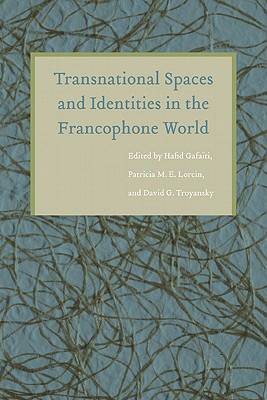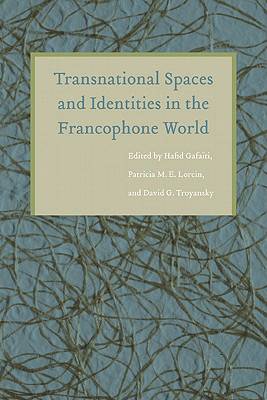
- Retrait gratuit dans votre magasin Club
- 7.000.000 titres dans notre catalogue
- Payer en toute sécurité
- Toujours un magasin près de chez vous
- Retrait gratuit dans votre magasin Club
- 7.000.000 titres dans notre catalogue
- Payer en toute sécurité
- Toujours un magasin près de chez vous
Transnational Spaces and Identities in the Francophone World
47,45 €
+ 94 points
Description
The dissolution of the French Empire and the ensuing rush of immigration have led to the formation of diasporas and immigrant cultures that have transformed French society and the immigrants themselves. Transnational Spaces and Identities in the Francophone World examines the impact of this postcolonial immigration on identity in France and in the Francophone world, which has encompassed parts of Africa, the Middle East, Southeast Asia, and the Americas. Immigrants bear cultural traditions within themselves, transform "host" communities, and are, in turn, transformed. These migrations necessarily complicate ideals of national literature, culture, and history, forcing a reexamination and a rearticulation of these ideals. Exploring a variety of texts informed by these transnational conceptions of identity and space, the contributors to this volume reveal the vitality of Francophone studies within a broad range of disciplines, periods, and settings. They remind us that the idea and reality of Francophonie is not a late twentieth-century phenomenon but something that grows out of long-term interactions between colonizer and colonized and between peoples of different nationalities, ethnicities, and religions. Truly interdisciplinary, this collection engages conceptions of identity with respect to their physical, geographic, ethnic, and imagined realities. Hafid Gafaïti is Horn Professor of French and Jeanne Charnier-Qualia Professor of French and Francophone Studies at Texas Tech University. He has published more than a dozen books. Patricia M. E. Lorcin is an associate professor of history at the University of Minnesota-Twin Cities, editor of French Historical Studies, and the author of Imperial Identities: Stereotyping, Prejudice and Race in Colonial Algeria. David G. Troyansky is a professor of history at Brooklyn College and at the Graduate Center, City University of New York. He is the author of Old Age in the Old Regime: Image and Experience in Eighteenth-Century France. Contributors: Trudy Agar-Mendousse, Robert Aldrich, Elisa Camiscioli, Habiba Deming, Philip Dine, Alain Gabon, Antony Johae, Neil MacMaster, Mary McCullough, Joseph Militello, David Prochaska, Johann Sadock, Todd D. Shepard, Sarah Sussman, David G. Troyansky, Georges Van Den Abbeele, Keith Watenpaugh, Brigitte Weltman-Aron, and Ali Yedes
Spécifications
Parties prenantes
- Editeur:
Contenu
- Nombre de pages :
- 488
- Langue:
- Anglais
- Collection :
Caractéristiques
- EAN:
- 9780803244528
- Date de parution :
- 01-07-09
- Format:
- Livre broché
- Format numérique:
- Trade paperback (VS)
- Dimensions :
- 150 mm x 226 mm
- Poids :
- 635 g






